Samsung SSD XP941 Review: The PCIe Era Is Here
by Kristian Vättö on May 15, 2014 12:00 PM ESTRandom Read/Write Speed
The four corners of SSD performance are as follows: random read, random write, sequential read and sequential write speed. Random accesses are generally small in size, while sequential accesses tend to be larger and thus we have the four Iometer tests we use in all of our reviews.
Our first test writes 4KB in a completely random pattern over an 8GB space of the drive to simulate the sort of random access that you'd see on an OS drive (even this is more stressful than a normal desktop user would see). We perform three concurrent IOs and run the test for 3 minutes. The results reported are in average MB/s over the entire time.
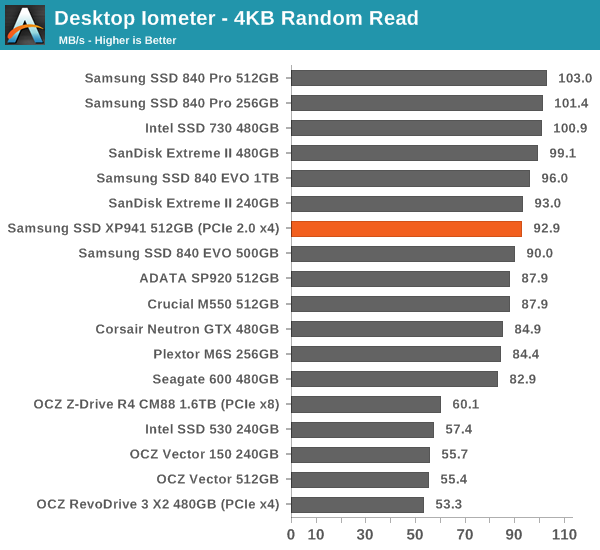
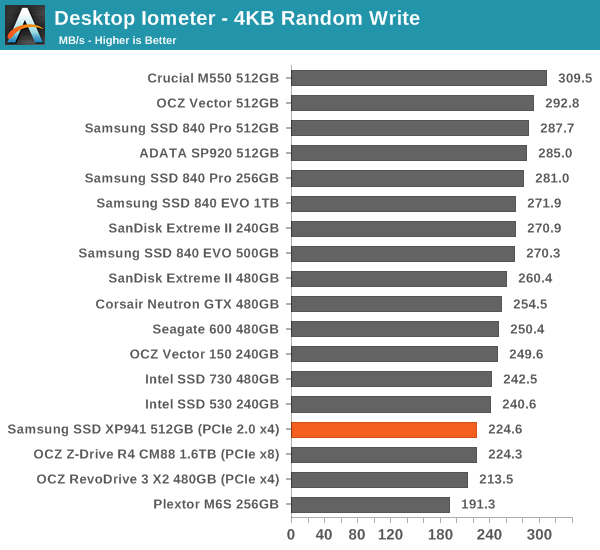
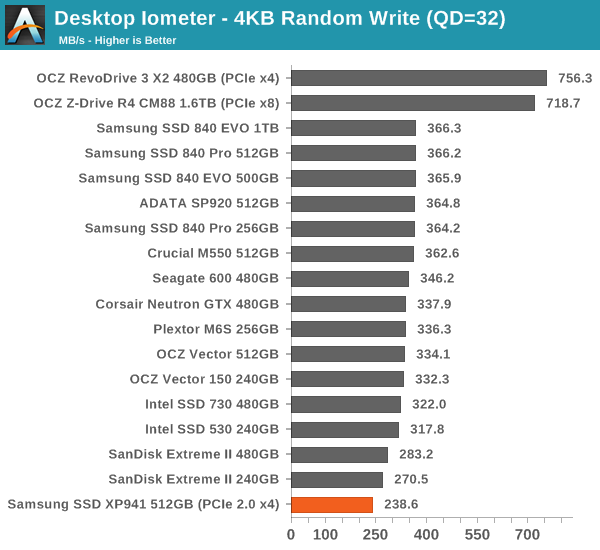
The random performance of XP941 doesn't stand out. Especially random write speeds are quite low by today's standards and queue depth scaling is close to non-existent. That said, I don't believe that high queue depth performance is really important for client workloads as our internal workload analysis shows that even under heavy use the average queue depth tends to be no more than 5. Our Storage Benches also show that even though the random performance isn't excellent, the strong sequential performance thanks to the faster PCIe interface makes up for the difference.
Sequential Read/Write Speed
To measure sequential performance we run a 1 minute long 128KB sequential test over the entire span of the drive at a queue depth of 1. The results reported are in average MB/s over the entire test length.
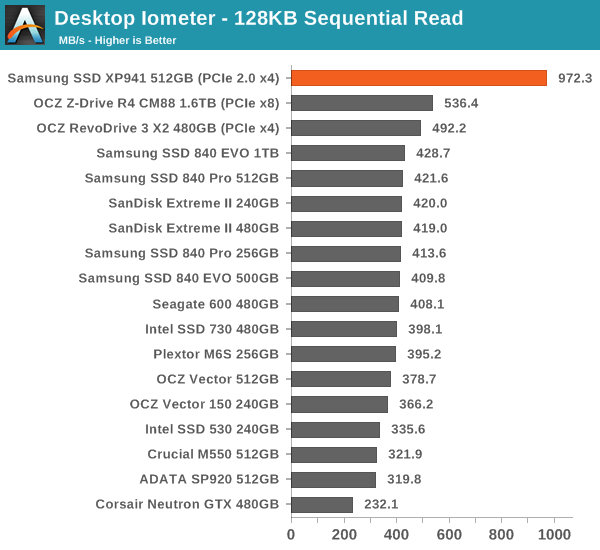
The sequential speeds are the highest we have ever tested in a consumer SSD. Even the 8-controller Z-Drive R4 behemoth can't beat the XP941, which really speaks for the efficiency of a single controller design. If you were to increase the queue depth, the Z-Drive would easily beat the XP941 since higher queue depth would increase parallelism and the Z-Drive could take advantage of all of its eight controllers. However, I was able to reach speeds of up to 1560MB/s with the XP941 at queue depth of 32, which is pretty much as fast as you can go with PCIe 2.0 x4 without tweaking any settings (the PCIe bus can be overclocked to achieve even higher speeds, though there can be a negative impact on random performance. We will investigate this at a later date).
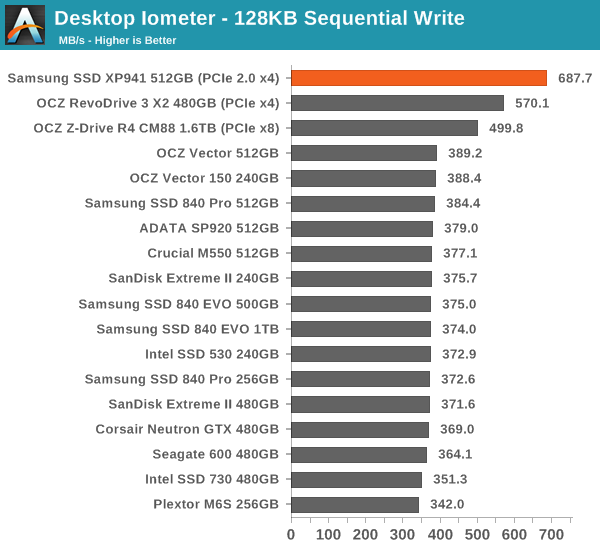
AS-SSD Incompressible Sequential Read/Write Performance
The AS-SSD sequential benchmark uses incompressible data for all of its transfers. The result is a pretty big reduction in sequential write speed on SandForce based controllers. The XP941 does brilliantly in AS-SSD as well but now the strength of eight controllers starts to show for the Z-Drive. Even then, the XP941 is still about twice as fast as the fastest SATA 6Gbps SSD.
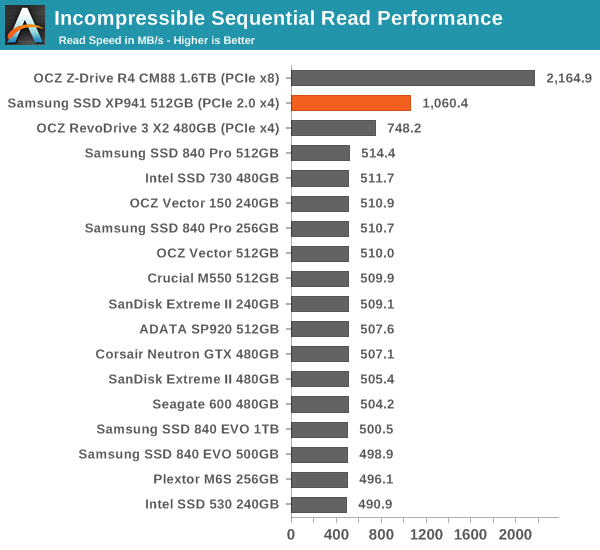
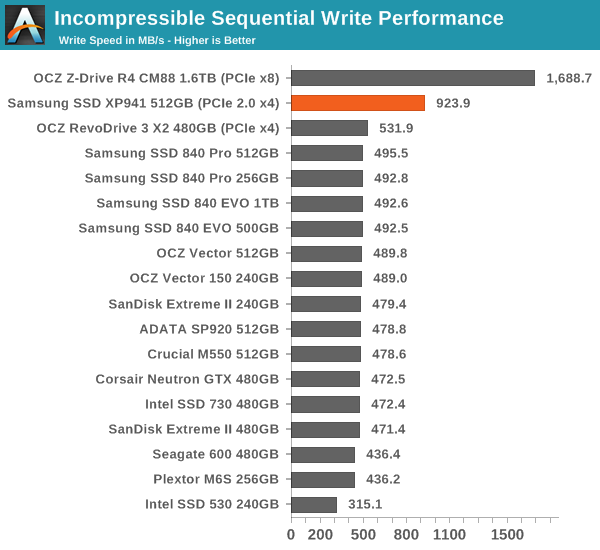










110 Comments
View All Comments
bharatwd - Thursday, May 15, 2014 - link
Hope something with these speeds comes in sata express.........however im gonna pick one of these as soon as it becomes available....im planning to buy z97 anyways :)mikeangs2004 - Thursday, May 15, 2014 - link
sata is being replaced by m.2. You're outdatedGalatian - Thursday, May 15, 2014 - link
No, you are...he is talking about SATA Express...M.2 is essentially the small form factor connector of SATA Express.Babar Javied - Thursday, May 15, 2014 - link
So use SATA Express when the M.2 is just as good? Also, you don't have to worry about the ugly SATA Express.I am still a little unclear on how SATA express works exactly but from what I understand is that SATA Express requires two PCIe lanes and only operates at x2 speeds whereas this can use the x4 lane. Plus, the M.2 form factor is much smaller than 2.5" used by SATA SSDs. Not that there isn't enough room in a desktop/laptop for a 2.5" drive but if there is no difference in performance why not get the physically small drive?
Again, i could be wrong about the lane speeds so please correct me if I am.
thanks
basroil - Thursday, May 15, 2014 - link
M.2 is a form factor and connector specification, it supports SATA Express, like in this caseSirKnobsworth - Thursday, May 15, 2014 - link
Not quite - SATA express defines an interface for PCIe x2 and 2 SATA ports to share the same pins one one connector. This particular flavor of M.2 just happens to implement PCIe x2 and SATA, but on separate pins.basroil - Friday, May 16, 2014 - link
Meant to say SATA Express supports M.2 rather than the other way around. And it's not just PCIe x2, the M.2 format currently supports up to x4, but the intel chipset and SATA 3.2 don't support above x2 just yet. In M.2, SATA is B and M keys, while PCIe is A B E and M (x4 ) keys, so SATA and PCIe do share some pins (but like you said, not in all cases)Galatian - Friday, May 16, 2014 - link
I don't really think it has anything to do with the Intel chipset. The mainboard manufactures are free to allocate the FlexIO how they like. They can use up to 8 x PCIe lanes, but of course have to reduce the SATA and/or USB ports then. Also the PCIe lanes are used for other things as well like the Intel Gigabit Ethernet port I think.Still I think for a top of the line mainboard it makes more sense to go for the x4 implementation and have a few SATA ports less.
basroil - Friday, May 16, 2014 - link
"I don't really think it has anything to do with the Intel chipset."The chipset does currently support only 2 lanes since the 3.2 specification is meant for 2 lanes, and Intel RST only supports 2 lanes. ASRock bypassed the chipset in it's 4 lane implementation, so it has nothing to do with flex IO (which is the chipset allowing more USB3.0 or SATA, or other things).
SirKnobsworth - Friday, May 16, 2014 - link
Right - x4 from the chipset would probably work just fine but you couldn't use it as a cache.